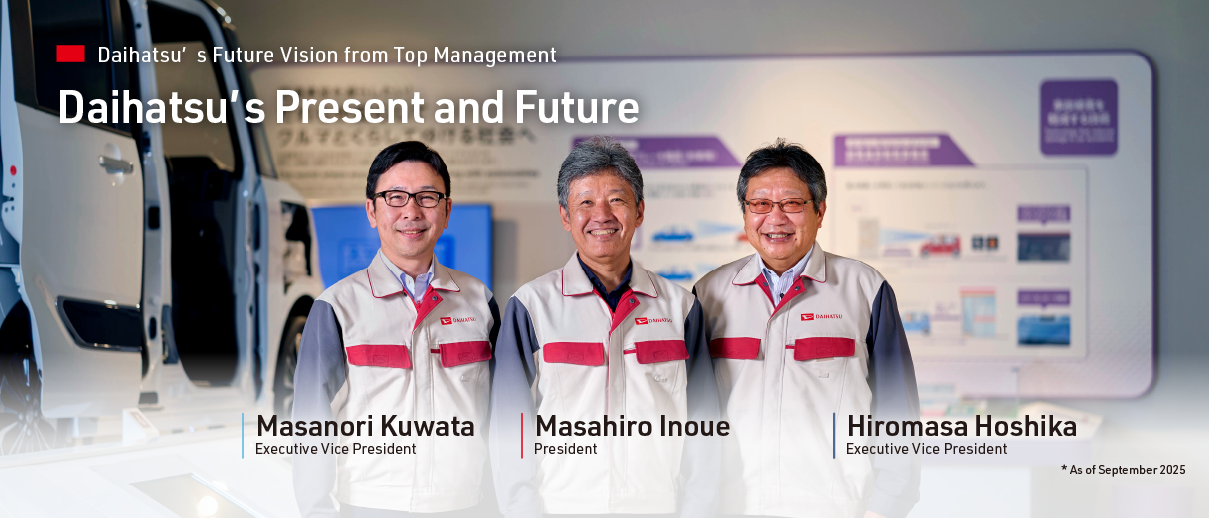
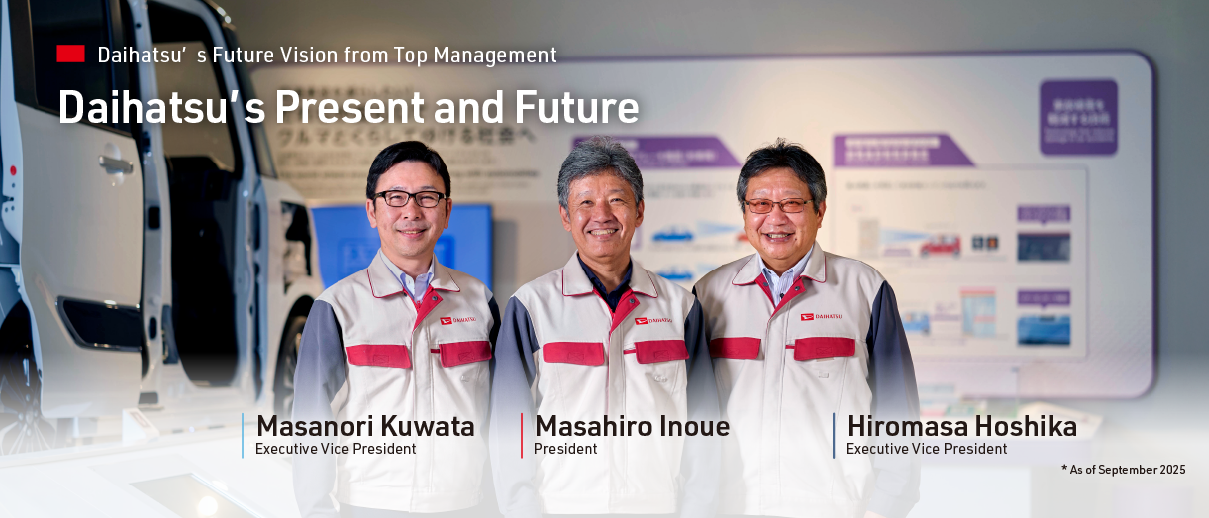
Daihatsu’s Future Vision from Top Management
Daihatsu’s Present and Future
One Year Since 3MASA Leadership Team Was Launched
Helping One Another from Different Domains as a Single Unified Management Team
Inoue:
I assumed this role at Daihatsu in March of 2024 together with Mr. Kuwata. I think that many in the company saw me as a sudden arrival here. The first decision we made as three directors together was to “avoid a wideranging consensus-building process.” If top management is giving mixed messages, frontline personnel will lose time checking to clarify what they should be doing. Instead, we three directors decided to have a thorough discussion and deliver a single message we would stick to. These were initially called the “Three Leader Meetings,” but someone noted that this sounded a bit self-important, so frontline feedback suggested we go with “The Three Masas,” as each of our names had “Masa.” (Laughs.) I thought this was a joke at first, but once we started using it, it immediately caught on throughout the company, and I felt it was a good name.
Hoshika:
From my perspective, the most important theme this year was, first and foremost, to put recurrence prevention on the right track. Once that foundation was in place, I felt that we had entered a phase of polishing up Daihatsu’s unique competitive strengths again. When all is said and done, Daihatsu’s strength is in the manufacturing (MONODUKURI) of high quality but affordable products. It is important for each and every employee to diligently work step-by-step to give shape and form to their own ideas and ambitions. Now, we can see that a company culture in which employees naturally work together across departmental barriers to support one another has begun to take root. Although there is some variance across sectors, we hope that everyone will cooperate to build an organization in which we understand and provide support for each other’s work in different fields.
Kuwata:
My priority since I came to Daihatsu has been to listen closely to what our employees think, first and foremost. After the certification scandal, many employees felt strongly that the company must make a strong comeback and could not fade away like this. Those feelings translated into a strong force pushing the company forward. Slowly but surely, I feel that people are starting to look forward to the future again. They have been thinking about and working on recurrence prevention as individual employees, and I think it is important for us to figure out how to best advance those efforts. We will also prioritize close communication with frontline personnel as we progress.
Reaffirming Daihatsu’s Strengths
High-quality Affordability and a Culture of Frankness
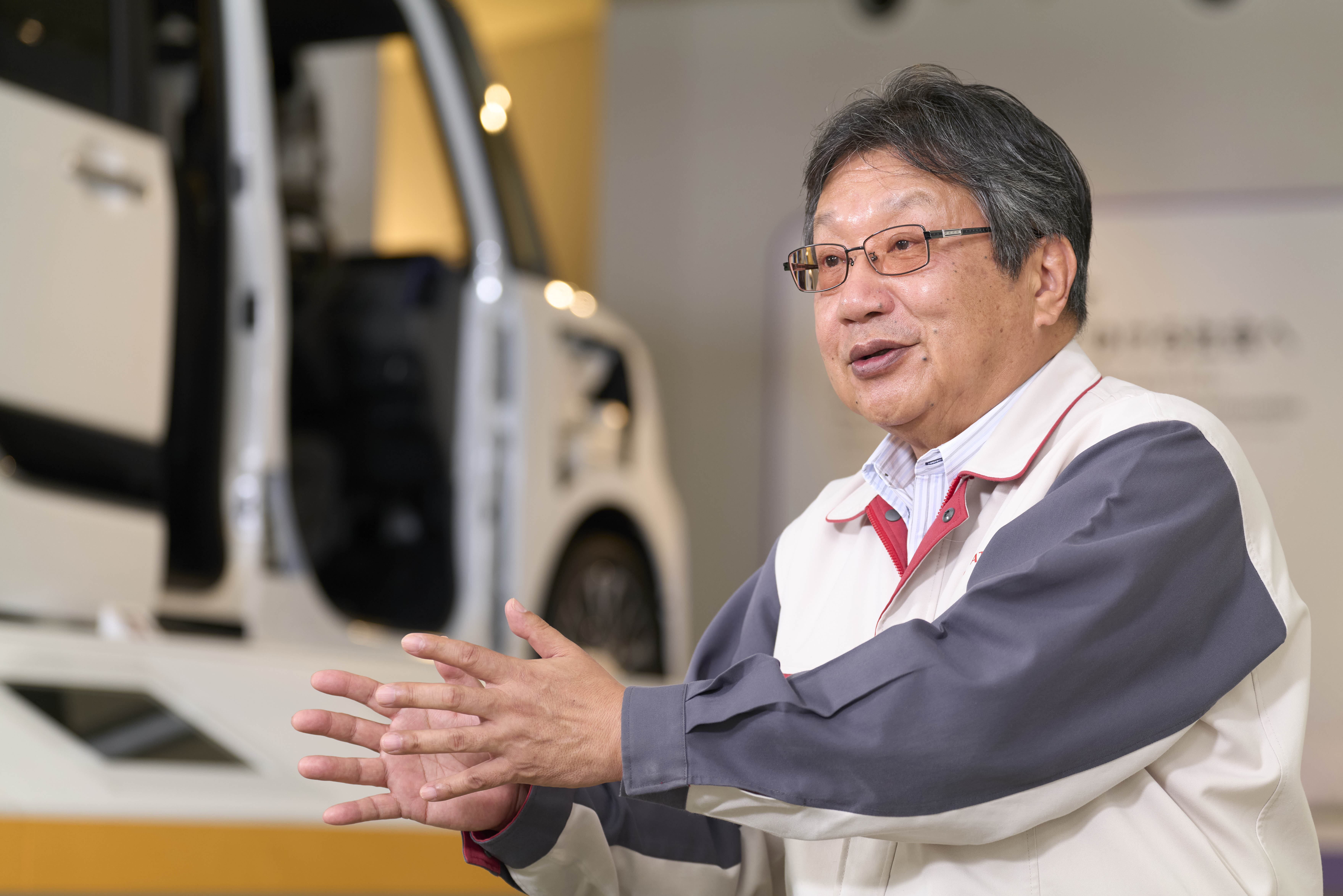
Hoshika:
Personally, I believe we need to make changes to the company culture itself first. The most important steps are to create a culture in which everyone is free to take on challenges for themselves, and an atmosphere in which supervisors are forgiving of failure. People volunteer ideas about how to make things better in the course of their daily work, and those ideas are tried out. I believe those efforts will accumulate in ways that gradually drive the company in a better direction. There was previously a lot of pressure and an atmosphere that tended to discourage failure, and that is exactly why it is important to build an environment where free exchange of opinions is permitted. To that end, we—3MASA—will aim to strike a balance in which personnel can set realistically challenging targets and job responsibilities while engaging in open conversations at each job level.
Kuwata:
I feel that Daihatsu has a deeply rooted culture of speaking frankly. This is particularly true of people in the western Kansai region of Japan, where honest communication is valued and they have a desire to speak their minds to one another, almost to the point of bluntness sometimes. I believe this is the basic foundation of this company. Another strong characteristic is the mindset of doing things ourselves. The approach of wanting to properly make quality products at low cost through ingenuity and improvement is really the genesis of Daihatsu’s high quality but affordable products. This is an expression of Daihatsu’s unique qualities. While cherishing that company culture, we must not forget that the real stars are, of course, the people working on the frontlines. We must become a company that listens to the feedback of those personnel and changes the aspects that get in the way of their work. We are gradually taking steps to reduce the number of ranks in the company, improve communication, and create an atmosphere conducive to frank and open dialogue, and we will continue to do so even if it takes some time to achieve.
Carbon Neutrality and Electrification
Unique Daihatsu Initiatives
Hoshika:
We deal in small vehicles like mini-vehicles and A-/B-segment cars, and I believe that small cars are extremely advantageous from an environmental perspective. Even in terms of recycling and effective use of resources, making vehicles lighter and smaller actually has an outsized impact. I think we need to look at all the different technologies out in the world and work to lower our environmental impact in a way that utilizes this advantage. Put in more concrete terms, even in the world of mini-vehicles, we need to pursue electrification. In terms of CO2 reduction, there is a cost disadvantage, but a key point moving forward will be to proceed with cheap electrification, or Daihatsu-style electrification. I believe it is important for us to proceed with development and manufacturing that leverage those positive aspects of mini-vehicles.
Kuwata:
As Mr. Hoshika says, the Daihatsu approach is about SSC (simple, slim, and compact). Small and simple designs are advantageous in terms of environmental impact and make for easy maintenance, making them well-suited to the era that lies ahead. In addition to making products, environmental solutions that achieve harmony with local communities are also important. Underlying this strategy is the accumulated awareness and mindfulness of individual Daihatsu employees. One example of this is the mini commercial van BEVs. With its limited battery capacity and travel distance, this vehicle has great potential in its role as being responsible for the “last mile” of logistics. Our first step is to deliver this product to the world, then to improve further as we see how customers use it and receive feedback.
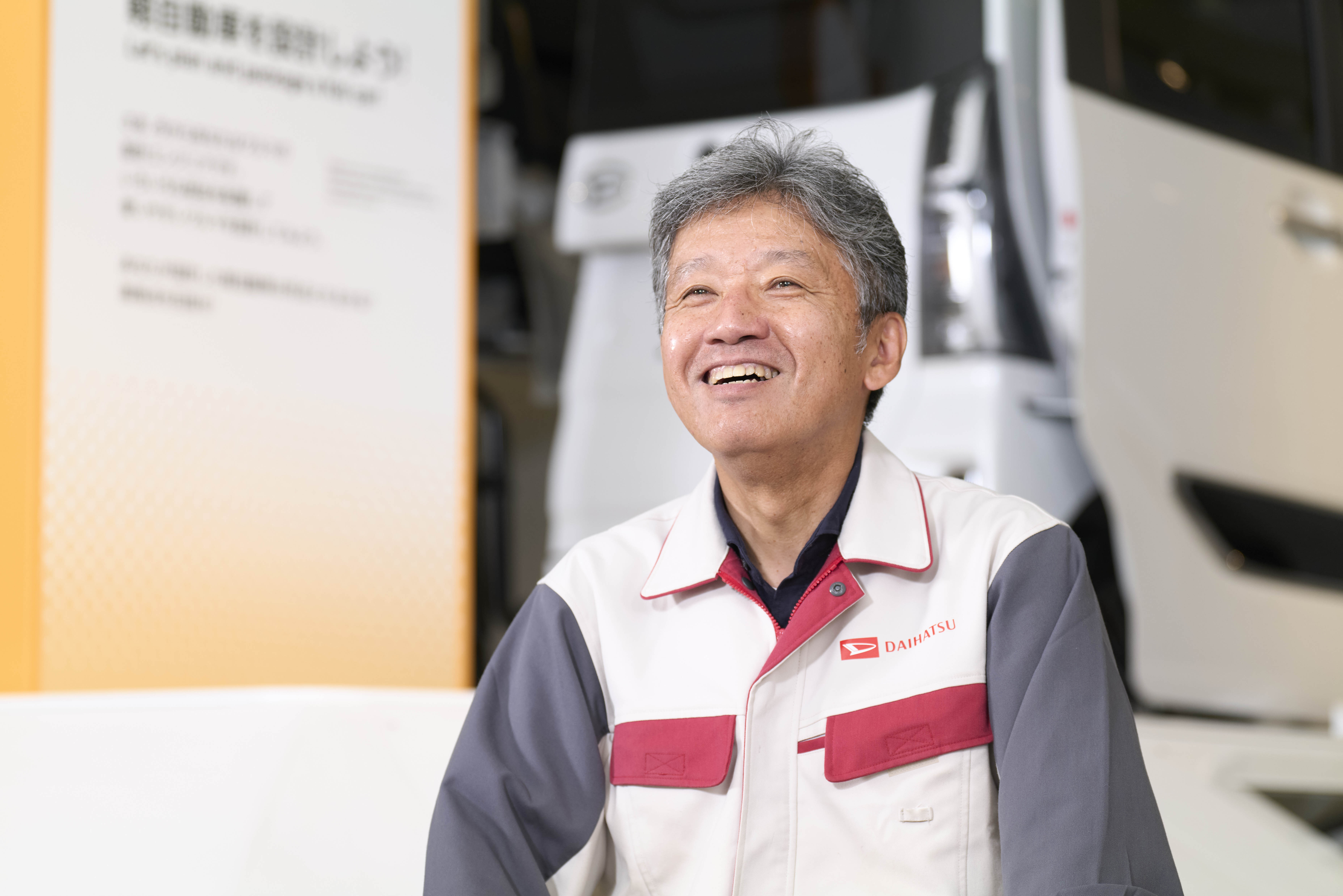
Inoue:
In aiming for carbon neutrality, we need to bring down the CO2 emissions both from the cars themselves as well as the manufacturing processes. Our target is the year 2035, but Daihatsu cannot possibly do this alone. There is no point unless carbon-free energy is available throughout the industry as a whole, requiring collaboration with the Toyota Group, the Japan Automobile Manufacturers Association, and the Japanese government.
There are also not enough mechanisms in the modern automobile industry for recycling and the rest of the 3Rs.*
Some progress has been made with respect to aluminum and iron, but there are still difficulties with recycling plastics and rare metals due to the low quantities used. In the future, mechanisms will be needed that trace where owned vehicles go and how they are reused, creating a cyclical process wherein those recycled materials are cheaper than using new resources. This is another major challenge that I hope Daihatsu can tackle in collaboration with the Japanese government and other industries.
* 3Rs: Reduce, Reuse, Recycle
Human Resources Development
A Company Focused on Doers
Kuwata:
I believe an important approach is to focus on “doers” as the main drivers. However, I have been in this position for a year and noticed some challenges that are still present in the company’s personnel systems and mechanisms. I hope to address these over the following years. The most important point is that forward-looking individuals who wish to grow can find the jobs and environment needed to make that growth a reality. Job roles need to be viewed in flexible terms to broaden opportunities for personal endeavors and growth. Looking carefully at one’s career and ambitions, we need to empower people to properly recognize and evaluate the results of their efforts and thoroughly follow-up on points in need of improvement. It is important to clarify the practice of basic ideas like this. While it takes resources to make this happen, we have also seen an increase in the number of employees wanting to hire new workers, and one pleasant change has been that some people have expressed an interest in internships.
Hoshika:
I’d like to add something onto what Mr. Kuwata said. From the perspective of having “all personnel take a central role at Daihatsu,” I think the most important point is to have relationships of frank and honest communication. There have been gradual improvements in this area, but if deeper dialogue were possible, I think we would see even more new ideas and endeavors arising naturally. In particular, leaders need the management skill to look carefully at individuals’strengths and think about what positions would best suit them and how work should be delegated to them. Rather than focusing on weaknesses, we should bring out strengths. That will empower the team as a whole, giving rise to mutual assistance and teamwork that will ultimately improve the entire company. I hope we can create that sort of company culture.
Inoue:
Looking back, sales used to focus primarily on the Japanese market. Today, more units sell overseas than in Japan, and of course the organizational structure and personnel assignments have changed as well. Due to Daihatsu’s failure to be more flexible in the face of changes in the past, we—3MASA—need to sketch out a clear vision of the 10-year future of Daihatsu, and to systematically rearrange the necessary personnel and systems in order to work towards that vision. We need to employ flexible staff re-assignments and opportunities for young people to grow in a variety of fields, both in Japan and abroad, creating synergies whereby personal goals align well with the company’s overall direction. I intend to work diligently until that is achieved.
Mobility of the Future
Daihatsu Remains Close to Customers’ Lives
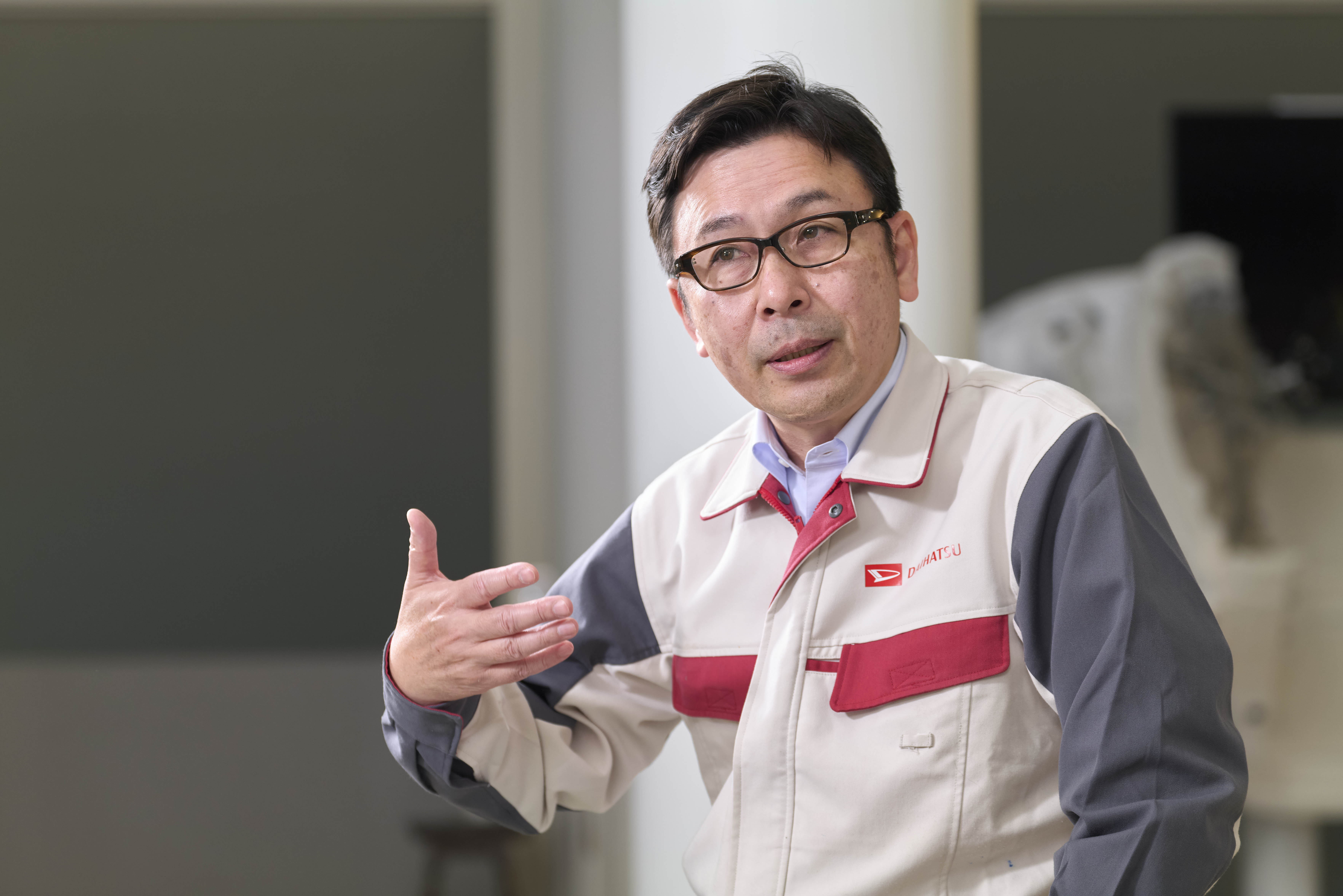
Kuwata:
A strong underlying concept of Daihatsu’s vehicles is “staying close to our customers,” which I believe is both important and interesting. When I visited the Osaka Expo with my family recently, my elderly father used an e-SNEAKER personal mobility device to get around, underscoring for me the importance of means of transport in our lives. One of Daihatsu’s biggest and most important missions is to provide “easy transportation” that supports people’s lives. There are challenges to be overcome such as electrification, cost, and convenience, but I think it will be increasingly important in the future for manufacturers to consider the customer’s perspective and create the vehicles best suited to each community and country.
Hoshika:
At the heart of Daihatsu is a desire to stay close to our customers and enrich their lives. We need to enhance and advance the way that we maintain this closeness. It is because our mini-vehicles and commercial vehicles are a part of life in their local communities that it is so important for us to know how customers really feel and apply that to car manufacturing. We need to draw on lessons learned in real life and feedback from frontline personnel, and apply these in our manufacturing. As with the e-SNEAKER, mobility development for the future needs to focus on products that satisfy customers’real feedback for “fashionable” vehicles.
Inoue:
As a member of the Toyota Group, Daihatsu’s role is not to build high-end vehicles that incorporate the latest technology, but rather to build solid “simple vehicles” like the Hijet or Mira e:S. If we take our high quality but affordable product technology, cultivated through mini-vehicle development, and apply it as appropriate to the conditions of each country, I believe we have tremendous potential for growth in Malaysia, Indonesia, and other emerging economies. Drawing on the Toyota network, we need to determine our own direction and take responsibility for personnel and organizational development as we push the company forward.
To Our Stakeholders
Striving to Be a Trusted Company Selected as a Partner
Hoshika:
I hope that Daihatsu can be a company at which every employee vigorously and proactively continues to seek out challenges. That environment will be the driving force that allows individuals to maximize their own potential and find an interest in and motivation towards their work.
Kuwata:
Building a work environment in which individuals can vigorously nurture their desire for personal growth will lead to better car manufacturing. I hope that Daihatsu can be a company that supports each individual’s endeavors without forgetting our genchi genbutsu approach and commitment to staying close to our customers. All of us should come together to create a company we are proud of, where we can say working at Daihatsu helped our own personal growth.
Inoue:
Through “mobility that’s close to your daily life,”Daihatsu has helped support the daily lives of many people. As a leading Japanese automobile brand, Daihatsu is expanding our responsibilities and potential throughout Japan and overseas. Moving forward, we will continue to steadily progress together with our diverse stakeholders, step by step, towards becoming a company that is continuously trusted and chosen as a partner.